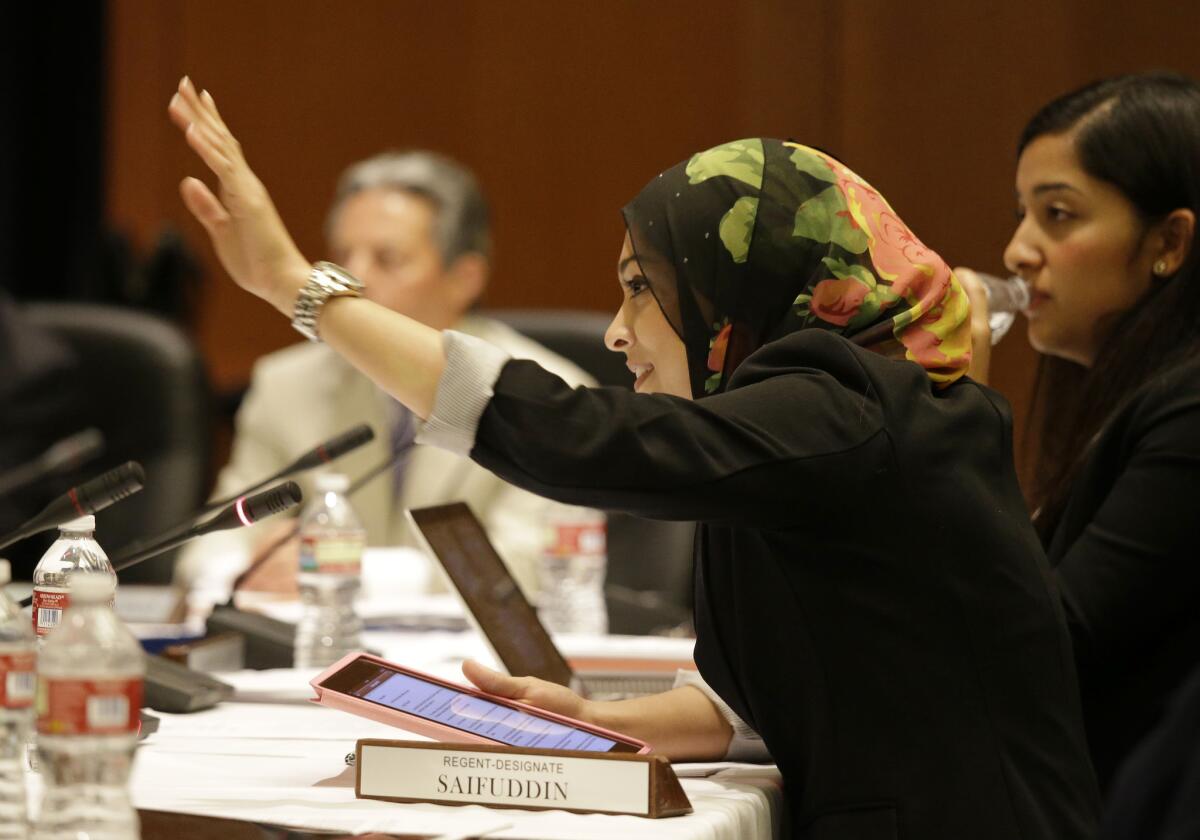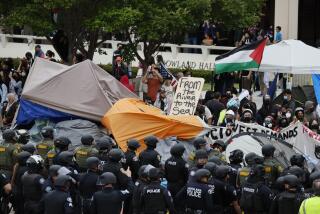The next UC student regent

- Share via
Congratulations to Sadia Saifuddin, who will be the first Muslim to serve as student representative to the University of California Board of Regents. Her resume for the post is a strong one: Since arriving at Berkeley, she has worked to increase the amount of financial aid available to students, to secure funding for the UC Berkeley Food Pantry and, as head of the student Senate’s finance committee, to allocate money to student groups.
But there’s one glitch. She is also a critic of Israel. Like many people, she opposes the occupation of the West Bank, the continued building of settlements and what she sees as the mistreatment of Palestinians. Earlier this year, she cosponsored a nonbinding resolution in the student Senate calling on the UC system to divest from companies that do business with the Israeli military.
Unfortunately for her, that’s the third rail of UC politics. When her nomination came before the regents on Wednesday, she was opposed by a number of pro-Israel groups, including StandWithUs and the Simon Wiesenthal Center, and by conservative activist David Horowitz, who wrote in an open letter: “If she were confirmed, it would set a dangerous precedent to encourage anti-Semitism on campus, which is already a big problem in the UC system.”
Regent Richard Blum, who abstained, said he believed Saifuddin was too divisive a figure and that a student representative should “represent all the students.”
Oh, for goodness’ sake, will this never stop? There’s no indication that Saifuddin is an anti-Semite, despite her criticism of Israel, her involvement with the Muslim Students Assn. or her condemnation of anti-Islamic “hate speech.” On the board, she says, she hopes to focus on financial aid reform and “bringing students together.”
Besides, what does it mean to “represent all the students”? No one can represent 220,000 students on every single issue. The regents were absolutely right to approve Saifuddin, which they did unanimously (except for Blum’s abstention).
It’s important to recognize, however, that this is part of a bigger, long-standing cultural clash on UC campuses. At UC Irvine, 11 Muslim students were arrested, charged and tried in court for repeatedly interrupting a speech by the Israeli ambassador in 2010. At Berkeley last year, Jewish students claimed they were the victims of a “pervasive hostile environment.” At UCLA, supporters and critics of Israel shouted at one another at a symposium a few years ago.
Universities should encourage broad debate on controversial topics. Protests are permissible, and professors and students alike should be allowed to take politically unpopular positions. But advocates on all sides should argue their cases respectfully and listen to opposing points of view.
Saifuddin calls herself a “huge advocate of free speech and of the responsibility that comes with free speech.” Let’s hope she will bring some maturity, tolerance and reason to the discussion of these highly fraught subjects.
More to Read
A cure for the common opinion
Get thought-provoking perspectives with our weekly newsletter.
You may occasionally receive promotional content from the Los Angeles Times.










